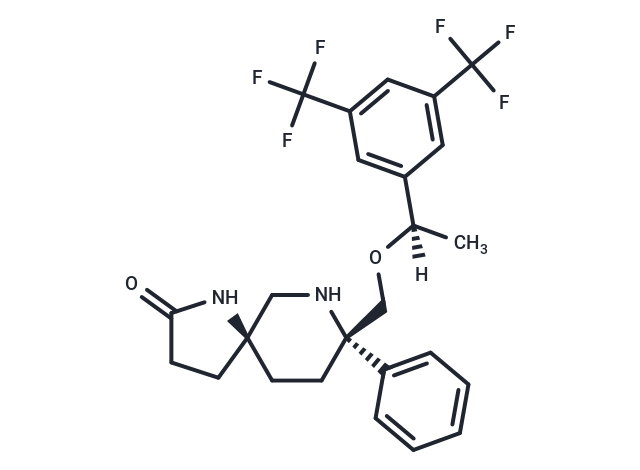- Remove All
 Your shopping cart is currently empty
Your shopping cart is currently empty
Rolapitant
Rolapitant (SCH619734) Hydrochloride is the hydrochloride salt form of rolapitant, an orally bioavailable, centrally-acting, selective, neurokinin 1 receptor (NK1-receptor) antagonist with potential antiemetic activity. Upon oral administration, rolapitant competitively binds to and blocks the activity of the NK1-receptor in the central nervous system, thereby inhibiting the binding of the endogenous ligand, substance P (SP). This may prevent both SP-induced emesis and chemotherapy-induced nausea and vomiting (CINV). The interaction of SP with the NK1-receptor plays a key role in the induction of nausea and vomiting caused by emetogenic cancer chemotherapy. Compared to other NK1-receptor antagonists, rolapitant has both a more rapid onset of action and a much longer half-life.

Rolapitant
| Pack Size | Price | Availability | Quantity |
|---|---|---|---|
| 1 mg | $43 | In Stock | |
| 2 mg | $60 | In Stock | |
| 5 mg | $85 | In Stock | |
| 10 mg | $126 | In Stock | |
| 25 mg | $198 | In Stock | |
| 50 mg | $328 | In Stock | |
| 100 mg | $490 | In Stock | |
| 500 mg | $1,090 | In Stock | |
| 1 mL x 10 mM (in DMSO) | $93 | In Stock |
Product Introduction
| Description | Rolapitant (SCH619734) Hydrochloride is the hydrochloride salt form of rolapitant, an orally bioavailable, centrally-acting, selective, neurokinin 1 receptor (NK1-receptor) antagonist with potential antiemetic activity. Upon oral administration, rolapitant competitively binds to and blocks the activity of the NK1-receptor in the central nervous system, thereby inhibiting the binding of the endogenous ligand, substance P (SP). This may prevent both SP-induced emesis and chemotherapy-induced nausea and vomiting (CINV). The interaction of SP with the NK1-receptor plays a key role in the induction of nausea and vomiting caused by emetogenic cancer chemotherapy. Compared to other NK1-receptor antagonists, rolapitant has both a more rapid onset of action and a much longer half-life. |
| Targets&IC50 | NK1:0.66 nM. (Ki) |
| In vitro | Rolapitant has a high affinity for the human NK1 receptor with a Ki of 0.66 nM and high selectivity over the human NK2 and NK3 subtypes of more than 1000-fold. Rolapitant has a preferential affinity for human, guinea pig, gerbil, and monkey NK1 receptors over rat, mouse, and rabbit[1]. |
| In vivo | Rolapitant reverses NK1 agonist-induced foot tapping in gerbils following both intravenous and oral administration up to 24 hours at a minimal effective dose (MED) of 0.1 mg/kg. Rolapitant is active at 0.1 and 1 mg/kg in both acute and delayed emesis models in ferrets, respectively which is the same as clinical data for other NK1 antagonists. The clinical efficacy of anti-emetics is highly correlated with efficacy in the ferret emesis model, suggesting rolapitant is a viable clinical candidate for this indication[1]. |
| Kinase Assay | Rolapitant is made at a stock concentration of 1 mM in 100% DMSO. For most receptor binding studies, the stock solution is diluted with the final concentrations ranged from 0.1 to 3 μM. Radioligand concentrations for competition binding studies ranged from 0.5 to 1 nM. For species comparison studies, 150 pM [125I]-BHSP is incubated with varying concentrations of protein (10-50 μg) prepared from gerbil, rabbit and monkey striata, and from cells expressing cloned rat, mouse and guinea pig NK receptors[1]. |
| Alias | SCH619734 |
| Molecular Weight | 500.48 |
| Formula | C25H26F6N2O2 |
| Cas No. | 552292-08-7 |
| Smiles | [H][C@](C)(OC[C@]1(CC[C@]2(CCC(=O)N2)CN1)c1ccccc1)c1cc(cc(c1)C(F)(F)F)C(F)(F)F |
| Relative Density. | 1.34 g/cm3 (Predicted) |
| Storage | Powder: -20°C for 3 years | In solvent: -80°C for 1 year | Shipping with blue ice. | |||||||||||||||||||||||||||||||||||
| Solubility Information | DMSO: 55 mg/mL (109.89 mM), Sonication is recommended. | |||||||||||||||||||||||||||||||||||
Solution Preparation Table | ||||||||||||||||||||||||||||||||||||
DMSO
| ||||||||||||||||||||||||||||||||||||
Calculator
In Vivo Formulation Calculator (Clear solution)
Dose Conversion
Tech Support
Keywords

Copyright © 2015-2025 TargetMol Chemicals Inc. All Rights Reserved.



